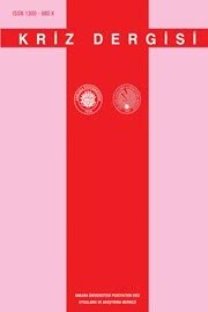Üniversite Öğrencilerinin Cinsiyete Göre Öfke İfade Etme Biçimleri
Anahtar Kelimeler:
Üniversite öğrencisi, öfke, öfke belirtileri, öfke ifadesi, öfke ile başetme
Anger Expression According to Sexuality of University Students
Objective: Anger is a basic emotional reaction for human being. If one can manage to express his / her anger in a constructive way this is healthly. To do that, person should be aware of his / her anger and give reasonable vent to his / her feelings. This study is a descriptive study aimed to determine the anger of expression according to sexuality of university students. Method: This study has been performed with the acceptance of the university students in Istanbul. The sample was consisted of 398 students from a university, the age range was between 17 and 27. Participants completed Multidimensional Anger Scale (MAS) and a demographic information form. The data has been evaluated statistically by means of SPSS data base used to frequencies, ANOVA and t tests. Results: There were statistical relationships in "taking seriously", "being injustice", "being criticized" subgroups (the girls have taken higher scores), "anger towards herself / himself" subgroup (the boys have taken higher scores than girls in anger towards himself subgroup), behaviours related to anger; "aggressive and anxious behaviours" subgroup (the boys have taken higher scores in aggressive behaviours subgroup, girls have taken higher scores in anxious behaviours subgroup), "interpersonal anger passive-aggressive reactions" and "introvert reactions" subgroups (the girls taken higher scores than boys in passive-aggressive and introvert reactions scores). Conclusion: The findings were discussed in relation to the relevant literature.
Keywords:
University student, anger, anger symptoms, anger expression, coping with anger,
___
- Akgül A (2003) Tıbbi Araştırmalarda İstatistiksel Analiz Etkinlikleri "SPSS Uygulamaları". Emek Ofset, Ankara.
- Balkaya F (2001) Çok Boyutlu Öfke Envan- terinin Geliştirilmesi ve Bazı Semptom Gruplarındaki Etkisi. Ankara Üniversitesi Sosyal Bilimler Enstitüsü Psikoloji Bölümü Yüksek Lisans Tezi, Ankara.
- Balkaya F, Şahin NH (2003) Çok Boyutlu Öfke Ölçeği. Türk Psikiyatri Dergisi, 14(3): 192-202.
- Batıgün AD (2002) Gençler ve İntihar Diğer Yaş Gruplarıyla Farklılaşan Özellikler, Yayımlanmamış Doktora Tezi, Ankara Üniversitesi Sosyal Bilimler Enstitüsü, Ankara.
- Biaggio MK (1989) Sex Differences in Behavioral Reactions to Provocation of Anger. Psychological Reports, 64: 23-26.
- Buntaine RL, Costanbader VK (1997) Self- Reported Differences in the Experience and Expression of Anger Between Girls and Boys. Sex roles, 36(9/10): 625-637.
- Çelik İ (2003) Öfke Tetikleyicileri Ölçeği: Bir Geçerlik ve Güvenirlik Çalışması. Çukurova Üniver- sitesi Soysal Bilimler Enstitüsü Eğitim Anabilim Dalı Yüksek Lisans Tezi, Adana.
- Deffenbacher JL, Oetting ER, Lynch RS, Morris CD (1996) The Expression of Anger and Its Consequences. Behavior Research and Therapy, 34 (7):575-590.
- Güney M (1985) Üniversite Öğrencileri Arasında Sorunlarla Semptomlara Arasındaki İlişkiler. 21. Ulusal Psikiyatri ve Nörolojik Bilimler Kongresi Bilimsel Çalışmaları, 98-101.
- İmamoğlu O, Gültekin Y (1993) Önerilen Dengelenmiş Toplumsal Birey Modeli Işığında Üniversite Gençliğinin Sorunları. Psikoloji Dergisi, 8 (30): 27-41.
- Kılıçarslan İ (2000) Lise Öğrencilerinin Sürekli Öfke ve Öfke İfade Düzeylerinin Bazı Değişkenlere Göre İncelenmesi. Yayınlanmamış Yüksek Lisans Tezi, Ondokuz Mayıs Üniversitesi Sosyal Bilimler Enstitüsü, Samsun.
- Kısaç İ (1999) Üniversite Öğrencilerinin Sürekli Öfke ve Öfke İfade Biçimi Düzeyleri. Mesleki Eğitim Dergisi, 1 (1): 63-74.
- Lerner H (1996) Öfke Dansı. Çev.: Gül S. Varlık Yayınları, İstanbul.
- Sala G (1997) Zonguldak Karaelmas Üniversite- si Öğrencilerinin Öfke İfade Etme Biçimlerinin Belirlenmesi. Hacettepe Üniversitesi Sağlık Bilimleri Enstitüsü Hemşirelik Programı Bilim Uzmanlığı Tezi, Ankara.
- Sharkin BS (1993) Anger and Gender: Theory, Research and Implications. Journal of Counselling & Development, 71 4): 386-389.
- Tambağ H, Öz F (2005) Aileleri ile Birlikte ve Yetiştirme Yurtlarında Yaşayan Ergenlerin Öfke İfade Etme Biçimleri. Kriz Dergisi, 13(1): 11-21.
- Thomas SP (1989) Gender Differences in Anger Expression. Health Implications. Research in Nursing and Health, 12: 389-398.
- Üstün B, Yavuzarslan F (1995) Öfkenin Gücü. Hacettepe Üniversitesi Hemşirelik Yüksekokulu Dergisi 2(2) :42-46.
- Yarcheski A, Mahon EN, Yarcheski JT (2002) Anger in Early Adolescent Boys and Girls with Health Manifestations. Nursing Research, 51(4) : 229-235.
- Yeşilyaprak B (1986) Üniversite Gençlerinin Psikolojik Sorunları. Psikoloji Dergisi, 5 (20): 80-84.
- ISSN: 1300-980X
- Başlangıç: 1992
- Yayıncı: Ankara Üniversitesi
Sayıdaki Diğer Makaleler
Depresyon Hastalarında Belirti Şiddeti Ve Umutsuzluğun İntihar Davranışı Üzerindeki Etkisi
M. AK, K.n. ÖZMENLER, A. BOZKURT
Üniversite Öğrencilerinin Cinsiyete Göre Öfke İfade Etme Biçimleri
N. BOSTANCI, Ş. ÇOBAN, Z. TEKİN, A. ÖZEN
İntihar Riskinin Değerlendirilmesi
Gurur Toplumu Bakış Açısıyla Türk Kültürünün İncelenmesinin Önemi
